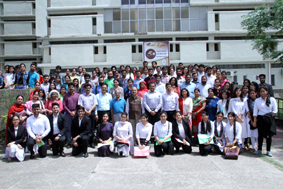 Early Times Report Early Times Report
JAMMU, Apr 26: The Law School, University of Jammu, in collaboration with United Nations Development Programme and National Law School of India University, Bengaluru, organized two-day Advance Regional Workshop on Biological Diversity Laws and Access and Benefit Sharing under UNDP-GEF (Global ABS Project) titled "Strengthening Human Resources, Legal Framework and Institutional Capacities to implement the Nagoya Protocol".
The purpose of the workshop is to give an understanding of the domestic as well as the international legal and policy framework on Biodiversity Law and Access and Benefit Sharing (ABS). The ABS mechanism allows local communities better opportunities to benefit from the use of their knowledge, innovations and practices related to biological diversity. The workshop, which began today, is being attended by over 150 participants drawn from different streams, viz., Indian Institute of Integrative Medicine (IIIM), School of Biotechnology, Departments of Environmental Sciences, Botany, Zoology, Human Genetics and Faculty of Law, Cluster University, Jammu, Central University of Jammu and Parade College, Jammu.
In the Inaugural function, Prof. Manoj Dhar, Vice-Chancellor, University of Jammu was the Chief Guest and Prof. M K Ramesh and Prof. Sairam Bhat from NLSIU, Bengauru were the Guests of Honour. Prof Dhar talked about the significance of biodiversity and highlighted the threats to biodiversity and need for the conservation and sustainable use of biodiversity. He said that having experienced heavy bio piracy in the last quarter of the century, there has been dire need for the proper regulatory bodies to check this menace and save biodiversity hotspots.
Prof. Ramesh in his address and lecture presented an overview of the Biodiversity Act, 2002 and talked about the provisions of the Act relating to biodiversity conservation and sustainable use. He emphasized that there is a vital need to bring about reconciliation between Central and State laws and policies that are incompatible with or contradictory to the principles of conservation.
Earlier, Prof Arvind Jasrotia, Director, The Law School and Coordinator Workshop, welcomed the guests and talked about the scope of the UNDP-ABS project. He hoped that J&K State Biodiversity Board will initiate the process of constitution of Biodiversity Management Committees (BMCs) and preparation of Peoples Biodiversity Registers (PBRs) at the earliest to enable local communities to reap the benefits. Prof. Sairam Bhat, Dr. Sapna Bansal and Dr. Raghav Parthsashtry discussed in detailed the Intellectual property related issues of the biodiversity.
They also highlighted the structure of Biological Diversity Act, 2002 (BDA) whereby three-tier system for biodiversity management has been envisaged: A National Biodiversity Authority (NBA) at the Centre, State Biodiversity Boards (SBBs) in the States and local-level Biodiversity Management Committees (BMCs) at the local body level for the purpose of achieving the objectives of the BDA within their local area jurisdiction. These implementing bodies have had to respond to both local realities and national requirements for regulating use and access to bio-resources and associated knowledge. Dr. Seema Rohmetra, Sr. Assistant Professor, The Law School coordinated the proceedings of the workshop.
The second day session will be taken by Dr. Pushpa Kumar Lakshmanan, Faculty of Law, University of Delhi on 'Nagoya Protocol and India' and Dr. Tarun Arora, Central University of Punjab who would speak on 'Challenges and Issues with respect to Biological Diversity Act and Research community'. The last session will be taken by Prof. Yashpal Sharma, Department of Botany, University of Jammu who shall present 'Status of Bio resources in the State of J&K'. |
